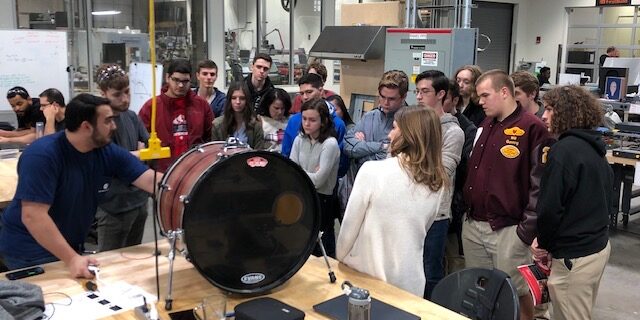 Dr. John Trent talks to school technicians about results on DataseamGrid.
Dr. John Trent talks to school technicians about results on DataseamGrid.(Louisville, Ky) – Nearly ten years ago John Trent Ph.D. of the Molecular Modeling Facility at UofL used the combined power of thousands of computers in classrooms across the state of Kentucky to discover potential compounds that stop cancer from growing. The University recently announced that their research team is now at a point in the development process to secure a commercial partner to take the technology to the next step.
READ STORY FROM UofL BELOW
John Trent and this team executed several runs on the DataseamGrid in the spring of 2007. The Grid helped the
 Johnson County teacher workshop helped staff maximize use in the classroom.
Johnson County teacher workshop helped staff maximize use in the classroom.research team narrow their search of over 12 million potential compounds to about 100 of interest, which they took to the laboratory for further analysis and development. Additional validation was done on the Grid against larger database of compounds in late 2010. Like most drugs it would take another decade to narrow the candidates, modify compounds, test and retest before proving they had a potentially viable treatment.
STOPS GROWTH OF ONE-THIRD OF HUMAN TUMORS
At the time the DataseamGrid consisted of about 7,000 machines running in 39 school districts. There where still a number of the early “white” iMacs and even some of the egg-shaped eMacs doing their job both in the classroom and powering research. With more computers and faster processors the current Grid produces ten times the processing speed and allows researchers to search with greater accuracy and look at many more possibilities. The current library is 34 million.
This added power helps UofL cancer researchers not only continue to make groundbreaking discoveries, but also makes it possible for them to attract millions of dollars in federal research grants, talented faculty and researchers, and potential business to the Commonwealth.
(Published July 22, 2020 from University of Louisville)
UOFL TECHNOLOGY THAT MAY INHIBIT PATHWAY FOR CANCER GETS COMMERCIAL PARTNER
By Betty Coffman
LOUISVILLE, Ky. — A University of Louisville-born invention that may help treat cancer now has a commercial partner.
Qualigen Therapeutics Inc., a California biotechnology company focused on developing novel therapeutics for the treatment of cancer and infectious diseases, has signed a license agreement for the technology and plans to fund continued development with UofL to ready it for market.
The technology works by targeting the RAS protein, which sends signals that regulate when and where the body produces and grows new cells. When mutated, the protein turns into a “stuck accelerator pedal,” according to UofL researcher Geoffrey Clark, Ph.D., who co-invented the technology with colleagues John Trent, Ph.D., and Joe Burlison, Ph.D.
 Dr. Clarke shares the research team’s progress with representatives from Dataseam schools during technology conference.
Dr. Clarke shares the research team’s progress with representatives from Dataseam schools during technology conference.“Normally, it gets pressed when you need to grow and then the foot comes off and the cell slows down,” said Clark, professor of pharmacology and toxicology at UofL. “When it becomes mutated, the accelerator’s jammed on, with cells continuing to grow and ultimately becoming a cancerous tumor.”
The drug targets only the active RAS protein and, so far, has little toxic effect on healthy cells. Many current non-targeted treatments, such as chemotherapy, can hurt both healthy and cancerous cells, leading to painful side effects. By some estimates, targeting this mutation could stop the growth of at least a third of human tumors.
“The patient impact could be extremely broad because RAS is involved in a lot of different cancers,” Trent said. “It’s one of the holy grails that there has been limited success in targeting.”
Trent leads the Molecular Modeling Facility (MMF) at UofL Health – James Graham Brown Cancer Center and the UofL partnership with Dataseam, a non-profit with a network of school computers across the state. When the computers aren’t being used by students, they’re connected to act as a distributed supercomputer, allowing researchers to process and analyze huge amounts of data.
Trent used that capability to run through millions of cancer-fighting drug possibilities in a matter of days. The result was a drug that could inhibit the deregulated RAS protein. Development of the technology was supported by the UofL NIH REACH ExCITE program.
Qualigen holds an exclusive license to the technology through the UofL Commercialization EPI-Center, which works with startups and industry to commercialize university-owned technologies. This license agreement builds on a sponsored research agreement with Qualigen for the development of several small-molecule RAS Inhibitor drug candidates. Qualigen also has licensed and is developing other UofL technologies for fighting COVID-19 and cancer.
“Partnering on this new cancer-fighting technology is another example of the relationship we’ve developed with the University of Louisville,” said Michael Poirier, CEO of Qualigen. “We look forward to working with UofL and to advancing this important clinical program with the goal of developing an effective treatment for this unmet need.”



